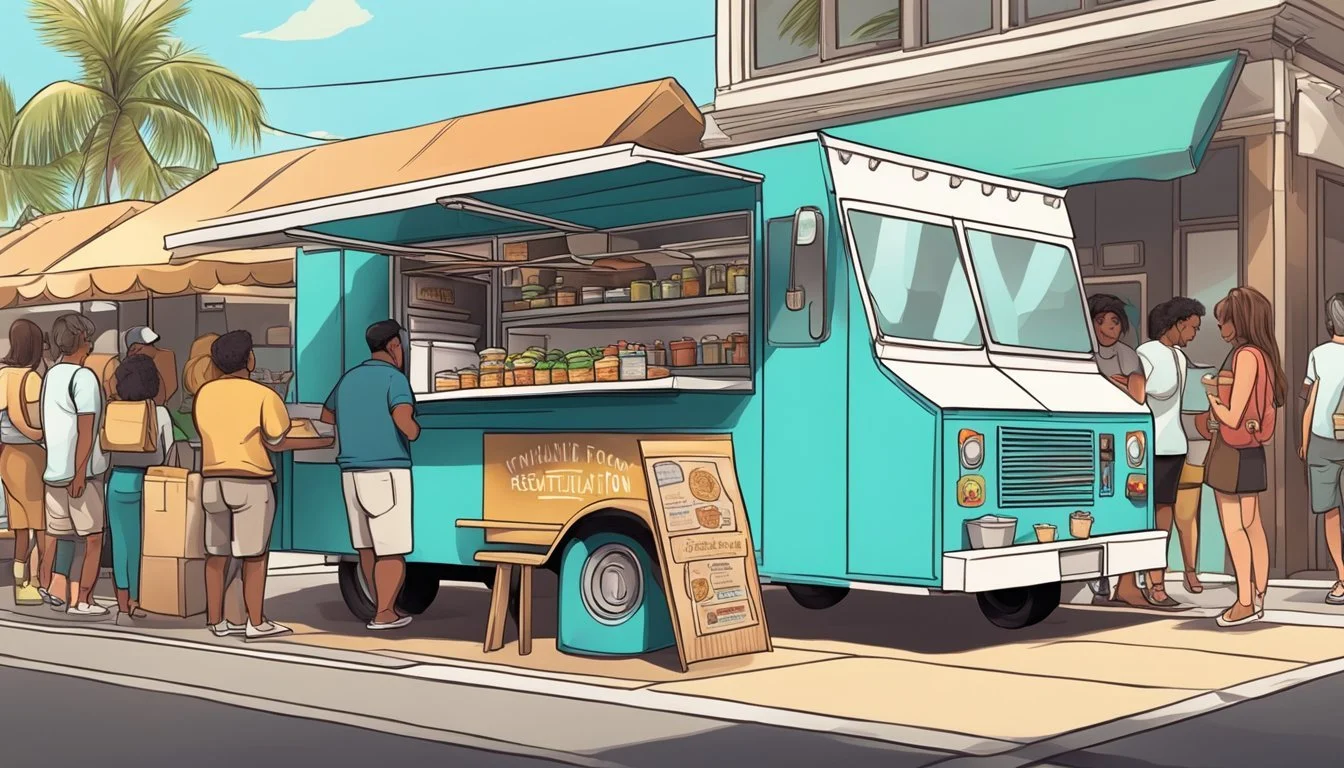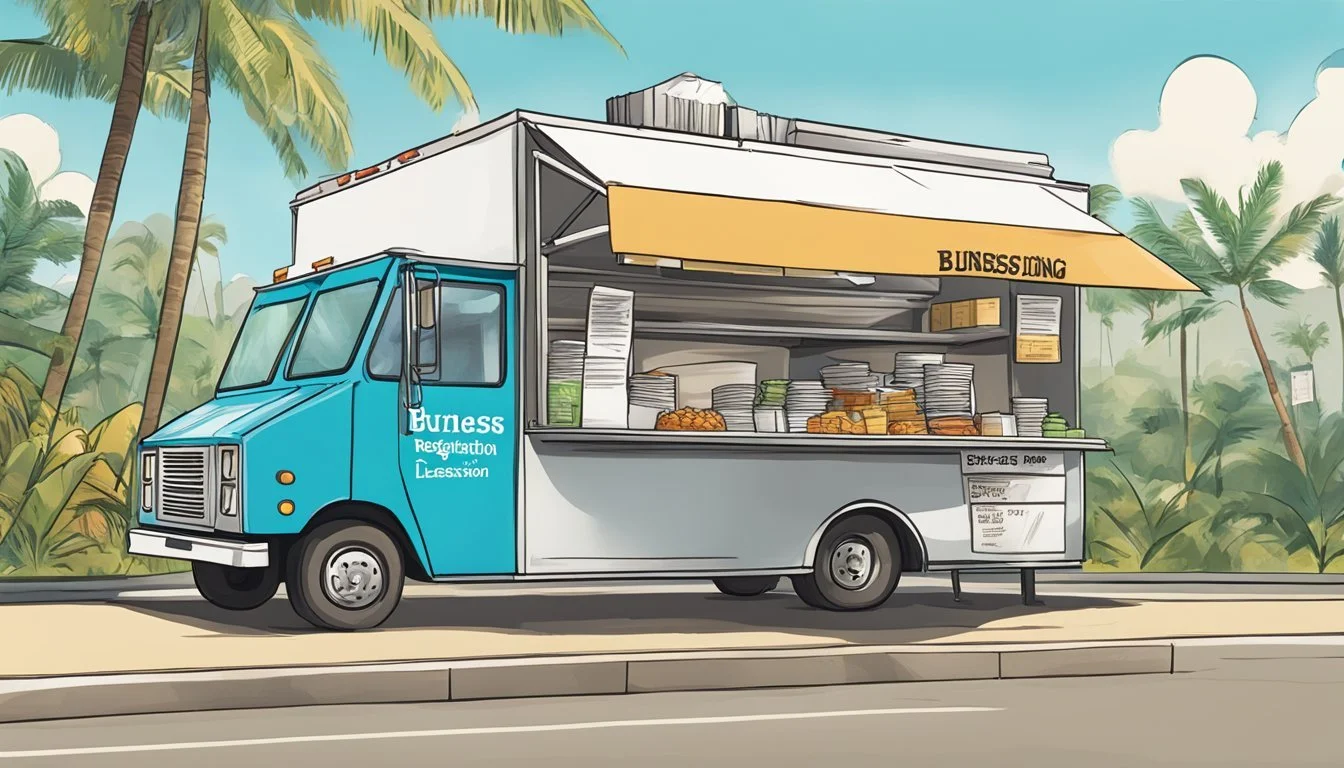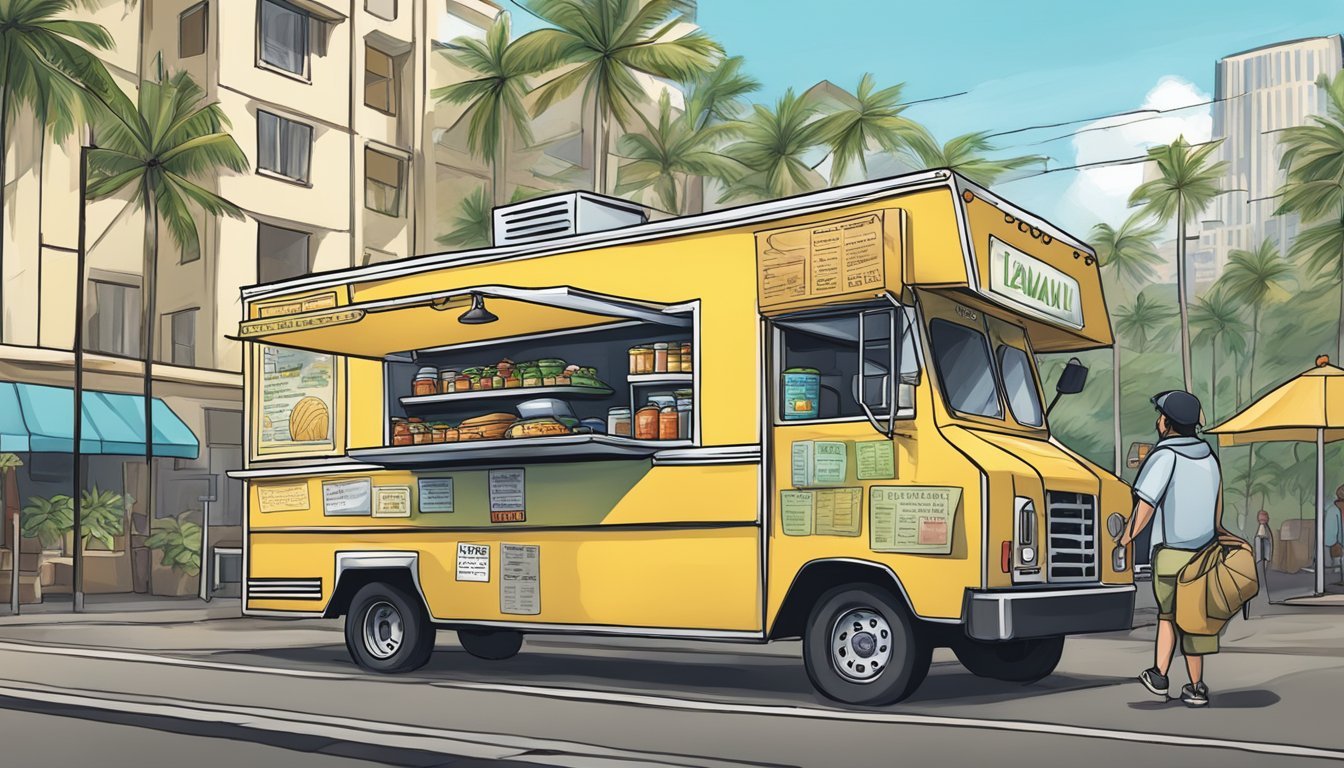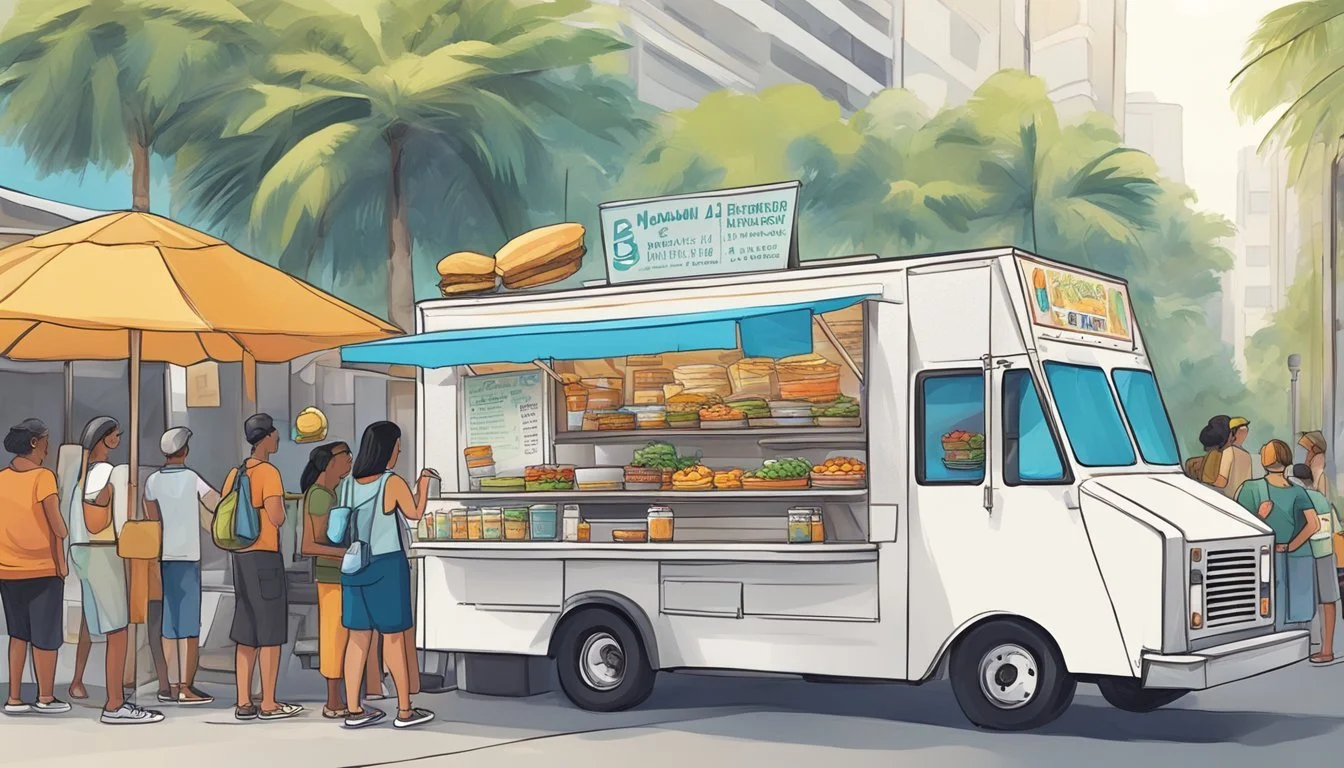Food Truck Laws in Hawaii
Navigating Regulations and Compliance
In Hawaii, the vibrant aloha spirit is complemented by a diverse array of culinary offerings found not just in restaurants but also on wheels. Food trucks in Hawaii offer everything from traditional Hawaiian dishes to fusion and international cuisine, becoming a staple of the local food scene as well as a tourist attraction. However, operating a food truck in the Aloha State involves navigating a comprehensive set of regulations and permits to ensure public health and safety, as well as compliance with traffic and parking laws.
Each food truck must acquire the necessary permits similar to those required for brick-and-mortar restaurants, such as a general business license, food handlers permits for employees, and a seller's permit. Additionally, there is a special food truck license, often referred to as a mobile food facility permit, which acknowledges the unique nature of their operation. These permits ensure that food truck operators meet the health standards set forth by the state and local municipalities.
It is important for food truck owners in Hawaii to understand that they are subject to both state regulations and the specific county laws where they operate. Each county may have different permit applications and requirements, making it essential for food truck operators to thoroughly research and adhere to these guidelines. Compliance with these laws guarantees food trucks can provide their services to locals and visitors while contributing to Hawaii's reputation for delicious and safely prepared food.
Understanding Food Truck Laws in Hawaii
Navigating the legal landscape is essential for food truck entrepreneurs in Hawaii. Adherence to specific regulations ensures the legality and smooth operation of these mobile establishments across the state.
Hawaii Administrative Rules (HAR) and Regulations
Under the Hawaii Administrative Rules (HAR), food trucks are subject to comprehensive regulations to operate legally. Infractions can lead to serious repercussions, including penalties and the potential closure of the food truck. All laws pertaining to traffic and parking, as stated in the HAR, must be observed by food truck operators. This includes adherence to parking meters, parking zones, and restricted areas where commercial activities are prohibited. Additionally, there are time limits for how long a food truck can stay in one location, which are generally limited to the parking space's designated time or for a maximum of three hours.
For more detailed information, food truck operators can refer to the Food Truck Information and Resources provided by the Hawaii State Department of Health.
State of Hawaii Specific Requirements
The State of Hawaii sets forth additional requirements beyond the general HAR. These specific mandates include the acquisition of various permits and licenses akin to those required by traditional restaurants. Food trucks in Hawaii must procure a business license, food handlers permits for each employee, and a seller's permit to be in compliance. A distinct food truck license, often referred to as a mobile food facility permit, is also mandatory.
Each food truck is expected to obtain a permit from the county health department it operates in. A valid license from the local police department can also be required, underscoring the importance of having thorough knowledge of both state and county-level directives.
To grasp the multifaceted requirements of operating a food truck in Hawaii, operators should consult the Food Truck Licenses and Permits Required in Hawaii guidelines. These resources clarify the groundwork necessary to maintain a legally compliant food truck business in the state.
Business Registration and Licensing
In Hawaii, food truck operators must navigate a comprehensive licensing process to ensure compliance with state regulations. This includes obtaining various permits, meeting vehicle requirements, and adhering to specific licensing for food establishments.
Navigating Permit Applications
To operate legally, food truck owners must first complete permit applications for a business license. They can acquire guidance and forms from the Hawaii State Department of Health's Food Safety Branch. The process is designed to verify that the food truck meets the hygiene and safety standards equal to that of a permanent food establishment.
Food Establishment Specific Licensing
Each food truck requires a food establishment permit, akin to permits held by restaurants, bars, and markets. This license ensures the business adheres to health and safety regulations. Food handlers must obtain individual permits to safeguard public health. Operators of businesses like tattoo shops may face different requirements, highlighting the need for tailored licenses for their unique services.
Vehicle Requirements and Inspections
Food trucks are subject to vehicle inspections to obtain a mobile food facility permit. This process ensures that all food equipment maintains proper temperatures and that the vehicle adheres to sanitary standards. Crucially, the vehicle must be registered and, depending on its type, may require the driver to hold a commercial driver’s license.
Special Event Permits
For temporary events like farmers markets and fundraisers, a special event food establishment permit is essential. This allows for the sale of food in a transient setting, provided that all health and safety standards are met. It's imperative for food truck operators to apply for these permits well in advance of the planned event.
Food Safety and Health Regulations
In Hawaii, the food truck industry is subject to rigorous food safety and health regulations to ensure the well-being of consumers. These regulations are implemented by the Hawaii State Department of Health and encompass a range of requirements from food handlers' certifications to periodic health inspections.
Food Handlers and Manager Certification
All food truck employees in Hawaii are required to obtain food handlers certification to ensure they understand food safety practices. Additionally, at least one employee with an advanced food safety certificate, such as ServSafe, must be on the premises during operating hours. These efforts by the Food Safety Branch promote educated decision-making in food preparation and handling.
Health Department Inspections and Compliance
The Department of Health mandates regular inspections for food trucks, checking for cleanliness and overall food safety compliance. These inspections are unannounced and aim to verify that all food truck operations are following the statutory guidelines.
Preventing Foodborne Illness
Key to the mission of the Department of Health is the prevention of foodborne illness. Food trucks must adhere to strict guidelines for food storage, cooking temperatures, and cross-contamination prevention, as detailed by the Department's food safety education materials.
COVID-19 Considerations
During the COVID-19 pandemic, additional regulations were introduced to minimize the spread of the virus within the food service industry. Food trucks are expected to follow recommended guidelines for social distancing, sanitation, and the wearing of protective gear to help ensure public safety. These guidelines are continually updated by the health department to reflect current best practices.
By maintaining high standards for food safety and health, Hawaiian food trucks contribute to a safer dining experience for their customers.
Operational Guidelines for Food Trucks
Operational guidelines for food trucks in Hawaii are detailed and designed to ensure food safety and public well-being. Food truck operators must navigate a series of regulations concerning equipment quality, fire safety, water and waste management, and adherence to local parking laws.
Equipment and Facility Standards
Food trucks in Hawaii need to be equipped with facilities that meet the standards for safe food handling. This includes maintaining proper food storage as per the Hawaii State Department of Health regulations. Equipment such as refrigeration units must be in good working order to keep perishable items at safe temperatures.
Fire Suppression and Safety
A functional fire suppression system is mandatory within the confines of a food truck. Regular vehicle inspections will check for compliance with fire safety standards. The use of fire-resistant materials in the construction of food trucks is also heavily emphasized.
Water Supply and Waste Disposal
Providing access to clean water is essential for both cooking and cleaning purposes. Food trucks must have an adequate water supply system. Equally important are waste disposal regulations, requiring operators to dispose of waste water and other refuse legally and hygienically.
Parking and Location Regulations
Food trucks must adhere to specific parking regulations, including time limits and parking zone restrictions. Local traffic codes dictate where food trucks can operate and how long they may remain stationary in a given location.
Each regulatory facet, from ensuring equipment functionality to meeting the fire safety standards, plays a critical role in maintaining a food truck's operational integrity in Hawaii. Operators are obliged to obtain a valid health permit and undergo regular inspections to uphold these standards.
Financial Aspects of Running a Food Truck
When entering the food truck industry in Hawaii, operators must navigate a range of financial obligations including state-mandated taxes and fees as well as acquiring the necessary insurance to protect their business.
Understanding State Taxes and Fees
Every food truck owner in Hawaii is required to address specific state taxes that impact the financial operations of their mobile business. These include, but are not limited to, the General Excise Tax (GET), which functions similarly to a sales tax but is levied on the business's gross income rather than directly on the consumer. This rate varies, but typically it's around 4%. Food trucks also need to consider fees for permits and licenses necessary to operate legally within the state.
General Excise Tax (GET): 4%
Permit and License Fees: Vary by county and type of permit/license
It is crucial for food truck entrepreneurs to integrate these costs into their pricing structure to ensure profitability while remaining compliant with state regulations.
Insurance and Liability
Maintaining adequate insurance is non-negotiable in mitigating risks and ensuring the sustainability of one's food truck business. The core type of insurance required is liability insurance, which covers a range of potential claims, including property damage, injury, and others that can arise during the operation of the food truck.
Liability Insurance: Essential for protecting against claims related to injuries and damages
Additional Coverage: May include vehicle insurance, workers' compensation, and property insurance for contents
The cost of insurance policies will vary based on the level of coverage, but proper insurance not only keeps the business on the right side of the law, it also instills confidence in patrons and partners alike.
Marketing and Customer Relations
Effective marketing and customer relations are critical for the success of food trucks in Hawaii. A well-crafted menu, strong brand identity, and active community involvement can significantly enhance visibility and patronage among both locals and visitors.
Designing an Attractive Menu
Creating a menu that reflects Hawaiian traditions while appealing to the tastes of a diverse audience is key. Incorporating local ingredients and flavors into dishes can attract those interested in authentic Hawaiian cuisine. For example:
Local Favorites: Offer dishes such as poke bowls and kalua pork sliders.
Visitor Attractions: Feature items that appeal to tourists in areas like Waikiki, such as tropical shaved ice with exotic flavors.
Food trucks must ensure the menu is both easy to read and visually appealing, as it serves as the first point of contact with customers.
Building a Brand and Online Presence
A strong brand identity is crucial for standing out in Hawaii's vibrant food truck culture. This includes:
Logo Design: A memorable logo that captures the spirit of the brand.
Website: A user-friendly website with an "About Us" page to share the food truck's story and a "Contact Us" section for inquiries and feedback.
Food trucks should leverage social media platforms to showcase their offerings and engage with their audience, announcing locations and new menu items regularly.
Community Engagement and Special Events
Participation in local events and festivals is an excellent way for food trucks to engage with the community. Acquiring a special event permit is necessary for legal compliance at such gatherings. Engaging strategies include:
Special Promotions: Hosting special promotions during Hawaiian cultural events.
Partnerships: Collaborating with local businesses and event organizers to cater to specific events or crowds.
Successful food trucks recognize the importance of fostering a sense of community, whether they're serving residents or the influx of visitors eager to experience Hawaii's unique food truck scene.
Additional Resources
When considering a food truck venture in Hawaii, resources are plentiful, comprising professional associations, comprehensive education programs, and direct guidance from the Department of Health. These assets provide valuable support, from navigating the initial stages of establishing a food truck, continuing education, to maintaining compliance with health inspections.
Professional Associations and Networking
Local food truck associations play a crucial role in the food truck community. Membership can provide networking opportunities with other food truck owners, partnerships with local businesses, and collective advocacy on regulatory issues. Food truck operators across the major Hawaiian islands, including Oahu, Maui, and Kauai, may benefit from joining professional networks.
Education and Training Opportunities
Education and training are paramount for anyone looking to operate a food truck in Hawaii. Prospective and current food truck owners should explore educational resources that cover food safety, business management, and culinary arts. Courses and workshops specifically tailored for food establishments and restaurant entrepreneurs can often be found through community colleges or culinary schools in Hawaii.
Contacting the Department of Health for Guidance
The Hawaii State Department of Health is a critical resource for food truck operators, offering ample guidance on regulations, health inspections, and employment practices. Operators can reach out directly for specific information regarding the State of Hawaii Business License, Food Service Establishment License, or Food Truck Vending Site Information. Contacting the Department is essential, especially for those operating, or planning to operate, on Oahu, home to a significant portion of Hawaii's food trucks.
Concluding Remarks
Operating a food truck in Hawaii requires compliance with various regulations and obtaining the necessary permits. Aspiring entrepreneurs should be prepared for a thorough process, including crafting a robust business plan and securing food truck licenses and permits specific to Hawaii.
It is imperative that food trucks adhere to the laws concerning traffic and parking, as well as Department of Health regulations. This ensures a smooth operation and that food truck owners stay within the legal framework. For instance, parking time limits must be respected and food trucks may only park for the designated time or for a maximum of three hours.
Licenses are essential; operators must possess a State of Hawaii Business License and a Certified Food Service Establishment License from the Department of Health. Additionally, acquiring a Tax ID number from the Department of Taxation is a non-negotiable step before one begins trading.
Providers must also consider the logistics of a Support Kitchen as home-kitchens are not permissible. Further information on establishing a mobile food unit can be found within the guidelines provided by the Hawaii State Department of Health.
In summary, attention to detail and adherence to regulatory demands ensure food truck businesses in Hawaii not only thrive but also contribute positively to the vibrant local culinary scene.






